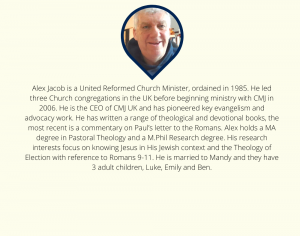1st Sunday in Advent
Sunday, November 29, 2020
Readings – Isaiah 64:1-9, Psalm 80:1-7 and :17-19, 1 Corinthians 1:3-9, Mark 13:24-37
Introduction – The first Sunday in Advent marks the beginning of the new liturgical year. Happy New Year! There are many ‘New Years’ but for most of us we will celebrate a New Year on January 1st , while the Jewish calendar marked a New Year back on the 19 th September. In addition to this often people talk of the academic (school) New Year, or the financial (tax) New Year. In whatever way we choose to measure our lives, new beginnings are always opportunities to reflect and to make plans. As we enter the season of Advent there are two great themes within the set Biblical readings. The first theme anticipates the Messiah’s Second Coming, while the second celebrates His First Coming. To fully understand and proclaim the Gospel we need to ‘hold together’ and affirm these two events.
Common Theme – Judgment is not a popular preaching topic, most likely because it involves unpleasantries. One valuable nature of the lectionary is that it makes us focus on all aspects of Scripture and not just our favourite passages from the Bible. The Scriptures before us revolve around the last judgment. They remind that God is both love and a consuming fire. In the end all things that are wrong will be made right and we are not excluded from that process.
Hebraic Perspective – 
Throughout the Bible we are made aware that God can and does bring judgment on the world. During the Exodus we see God enter into judgment against the gods of Egypt. God is a redeemer, a provider, sustainer and lawgiver. Later, the prophets remind the people that for disobedience judgment looms at the hands of the living God! During the 2nd Temple period the responsibility to enact the final judgment was understood to be the task Messiah. The Dead Sea Scrolls community named Melchizedek as the coming messiah and spoke of a day in which he would exact judgement. The criterion for judgment is echoed in the prophets of Israel. It is a care and concern for the weak members of society, the poor, the orphan and widow. Proverbs 19:17 explains that the concept of helping the poor is actually helping the Lord, and the Lord is faithful to reward. This is not biblical socialism. Being poor does not make you holy and being wealthy does not make you evil. Instead it is about imitating God’s character as follows of the Messiah.
Reading #1 – Isaiah 64:1-9: The prophet Isaiah is prominent in most of our Old Testament liturgical set readings for Advent. In these verses we have the aspiration of the faithful remnant of Israel. As the faithful look back to the mighty acts of God in the history of Israel there is a deep desire for God to act once again (to ‘come down’) in the present. Within all of this there is a deep awareness of sin and the searching for salvation (:6). The question asked in verse 6 is repeated in a very different context in Acts 16:30.
Reading #2 – Psalm 80:1-7 and 17-19: The Psalm echoes and affirms the reading from Isaiah. Again there is an appeal or call to God that God will act to save (:2 and :19) to restore (:3, :7 and 🙂 and to return (:14). In many ways these acts of salvation, restoration and return are woven into the story of Israel, and the message of the Kingdom of God.
Reading #3 – 1 Corinthians 1:3-9: In this opening section of Paul’s letter there is an outpouring of thanksgiving. A thanksgiving rooted in what the Messiah has done, is doing and will do (note the phrase ‘eagerly wait’ in verse 7) . All of this affirms the total faithfulness of God (:9).
I think many of us find the practice of ‘waiting’ to be somewhat of a challenge. Most of us will not wait ‘eagerly’. Yet ‘waiting’ is an important part of our discipleship and spirituality. The early community of the disciples of Jesus began by waiting. For ten unique days, those early disciples were simply waiting in Jerusalem. They were not told exactly how long this wait would be, but they knew of the hope which was in front of them- namely the mysterious and wonderful promise of the full baptism in (or of) the Holy Spirit (Acts 1:4-5).
This task of waiting is part of Advent. Waiting is enhanced by three qualities. Firstly, waiting quietly; waiting is not a passive act, but rather in quietness and trust is our strength (Isaiah 30:15). In this quietness there is an opportunity to become receptive to God’s plans and we can begin to empty ourselves from our own ‘agendas’ and preoccupations. Secondly, waiting faithfully; within times of waiting there can be a growing trust in God- the God who keeps all His promises, the God of Abraham, Isaac and Jacob, the Faithful One. Having stilled our hearts and minds we need to wait in faith. Thirdly, waiting expectantly; in this waiting our longing for God can grow and strength is renewed (Isaiah 40:31). It is here that we can begin to renew our vision and enlarge our hope.
Reading #4 – Mark 13:24-37: In this section of Mark’s Gospel we have the only place in Mark’s Gospel where we hear Jesus giving a long consecutive teaching on a single topic. The teaching is focused on the end of the age and both Matthew 24:1-51 and Luke 21:5-36 contains similar and complimentary teaching on this important topic. The section begins with the words ‘in those days’ (:24) which is a well known Old Testament saying linked to the end times (see Jeremiah 33:15-16, Joel 3:1 and Zechariah 8:23).
In verse 26 there is a clear reference to the Second Coming. In connection to this there is the call to learn from the fig tree. Linked to this is the assertion that no one knows the timing of the Second Coming, and linked to this is the command to watch. This implies a readiness and a high level of expectancy.
The interpretation and application of the term ‘this generation’ (:30) and ‘all these things’ (:30) has been and is still a major area of theological debate. There are three main lines of interpretation. Line 1 sees ‘this generation’ as referring to those people listening to Jesus at this point in the ministry of Jesus. Many of this group of people would still be alive to witness ‘all these things’ which in this line of interpretation refers to the ascension of Jesus and the outpouring of the Holy Spirit, plus the destruction of Jerusalem (AD 67-70) . ‘All these things’ in this line of interpretation is not understood to include the Second Coming because to do so would imply that Jesus was mistaken about the timing of His return (this view of Jesus being mistaken is promoted in line 3).
Line 2 takes the view that ‘this generation’ refers not to those alive when Jesus gave this teaching, but refers to Jewish people as a distinctive race of people. Here generation is used in an ethnic and not a chronological sense. This view allows one to affirm (without concluding Jesus was mistaken) that ‘all these things’ do refer primarily to the Second Coming of Jesus, and not just to the outpouring of the Holy Spirit and the historical destruction of Jerusalem in the first century. In this line of interpretation the teaching of Jesus is understood to be saying that the Jewish people (and the Jewish nation?) will be in place to witness the Second Coming. In this case Jesus is affirming the teaching given in Jeremiah 31:35-37. In this line of interpretation, there are many Christians who see not just the promise of the preservation of Jewish people until (and beyond) the Second Coming, but also the presence of a Jewish nation (when the Messiah returns) is affirmed by scripture. In this case the restoration of Israel as a nation in 1948 has huge ‘end-times’ (eschatological) implications.
Line 3 as in line 1 interprets ‘this generation’ as those people listening to Jesus when he gave this teaching, but interprets ‘all these things’ as a reference to the Second Coming. Therefore one concludes that Jesus was expecting to return and to establish His Kingdom within one generation of His ascension. Clearly in this view Jesus was mistaken.
It may not surprise you that I rule out the interpretation given in line 3, and on balance I follow the line of interpretation given in line 2.
Hebraic Context – In Hebrew the eschatological end times are usually called אחרית הימים ‘end of days or the last days’. The term first appears in Numbers 24:14. The context in Numbers is Balaam the prophet who was contracted by Balak king of Moab to curse Israel. Instead of being able to do so he was only able to bless. The last days thus include both a blessing and a curse, something good and something bad. A rabbinic discussion recorded in the Talmud notes that when things start looking bad, that’s the time to look up as the redemption draws near. ‘Rabbi Johanan said: When thou seest a generation overwhelmed by many troubles as by a river, await him, as it is written, when the enemy shall come in like a flood, the Spirit of the Lord shall lift up a standard against him; which is followed by, and the Redeemer shall come to Zion’ (Sanhedrin 98a). The Hebraic perspective to the last days acknowledges that there is a judgment, and that the believer should not be afraid. However the faithful should also acknowledge the need to be alert and in readiness, with the potential for suffering and persecutions beforehand.
Further Reading – As we enter Advent there are a great number of study resources which can help us in our preaching and teaching roles. Let me mention just two at this stage;
– The first in a major new book by Michael Vlach – He Will Reign Forever – A Biblical Theology of the Kingdom of God (Lampion House Publishing, 2020).
– The second is a CMJ book by Alex Jacob- Prepare the Way! (Glory to Glory Publications, 2014).
About the Author


